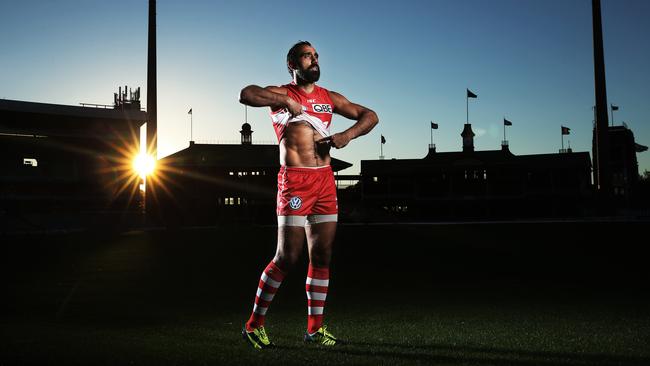Susie O’Brien: Vile social media posts after Port v Crows Showdown prove racism still prevalent in AFL
THE nasty brawl between fans at the Showdown in Adelaide got a lot of attention. But Susie O’Brien argues the real issue that should worry the AFL is vile racist posts that then surfaced on social media.
VIC News
Don't miss out on the headlines from VIC News. Followed categories will be added to My News.
- Showdown brawl between footy fans goes viral
- Eddie Betts speaks out over banana-throwing fan
- McDermott’s view: Everyone needs to fight racism
RACISM directed at indigenous players is the shameful dark heart of the AFL.
Last weekend the much-anticipated showdown between the Adelaide Crows and Port Adelaide ended in a nasty brawl between fans. After the game a dozen or so fans spat at each other, got physical and exchanged insults.
This little spat between bogan fans fuelled by beer generated considerable publicity, but it will soon be forgotten. Meanwhile, pervasive racist attitudes continue to be expressed, and yet are not condemned or discussed to the same extent.
Sadly, the match seems to have been a springboard for the exchange of a range of racist views towards players from both teams, including the Crows’ Eddie Betts. Clearly, racism continues to be a major issue for the AFL, and one clubs seem incapable of properly addressing.
After Saturday night’s game, two posts written by a female Port Adelaide fan were widely shared on a South Australian Facebook page.
Some of the comments about Betts and Crows captain Taylor Walker are too contemptible to repeat here, but there is a reference to Betts being an “ape”, and “going back to the zoo where him (sic) and his family belong”.
The post, which was displayed on a forum with more than 100,000 members, had 226 shares and more than 600 comments.
Many of those who commented called the woman who posted the comments a “horrible human being” and a “moron”.
But the fact that the defamatory posts were displayed in full on a well-respected forum in a bid to encourage discussion is a very worrying sign.
Today the Port Adelaide Football Club confirmed the woman who wrote the comments is not a member, although she is known to the club.
The club confirmed it has also received reports about a number of racial comments directed at some of its high profile indigenous players on Saturday night.
Indeed, there are references online to fans hearing disparaging comments also being made about Port Adelaide indigenous player Paddy Ryder.
A spokesman for the club said the players are “not seeking for this to be elevated any higher”.
Although it’s convenient for Crows fans to point the finger at Port Adelaide followers, it’s clear racism against indigenous players is not confined to any one club.
It’s not hard to find similar posts targeting indigenous players.
Another young male on Facebook from Adelaide — whom I will not name here — posted a link to a story about Betts, making disparaging and crude comments about his appearance.
Sadly, the remarks were met with little outrage from his friends, who seemed to think it was funny.
Betts, too, has been the target of racism in the past, and last year even had a banana thrown at him, which was widely interpreted to be a racist act.
Indigenous players from a range of clubs are also often singled out by opposition fans, including West Coast Eagle Lewis Jetta.
One of the most targeted indigenous player was Sydney Swans star player Adam Goodes, who was often booed and jeered when he played. In 2013 Goodes pointed out a 13-year-old girl who called him an “ape”.

Astonishingly, it’s still asserted by some that the treatment of Goodes was not racist because there are many other indigenous players who are not given the same treatment.
I strongly disagree. Goodes was singled out because he has directly confronted racism and exposed it, and has acted as an ambassador for other indigenous people.
Such actions made him a particular target for racist abuse.
Others say racism takes more indirect forms. In February, Fremantle coach Ross Lyon claimed speculation about indigenous player Harley Bennell’s calf injury was racially motivated.
It’s my experience that a white footballer has a calf injury and it’s a calf injury and a black footballer has a calf injury and it’s a drug problem,” he said.
It’s not surprising, then, that an AFL and Victorian Government research project found racism was a feature of seven of the eight clubs it investigated. Indigenous players reported feeling stereotyped by non-indigenous players and regularly heard racist taunts from the stands at AFL games.
It’s up to the league to take a stand against all racism against players, whether expressed online, in the media or by fans at matches.
Such behaviour seriously undermines other measures taken to promote indigenous players.
Port Adelaide, for instance, has nine indigenous players, a dedicated Aboriginal Academy team and extensive Aboriginal community programs.
Bodies like the AFL should do what they can to combat sexism, racism and homophobia.
Individual players, who are such powerful role models in our community, should speak up about racist attitudes and behaviour.
For the way forward we should look towards players like Betts and Goodes, who have shown grace and compassion towards some of those who have been so cruel to them.
In the end, it’s only a game, but its power to bring out social change should not be underestimated.
Originally published as Susie O’Brien: Vile social media posts after Port v Crows Showdown prove racism still prevalent in AFL


